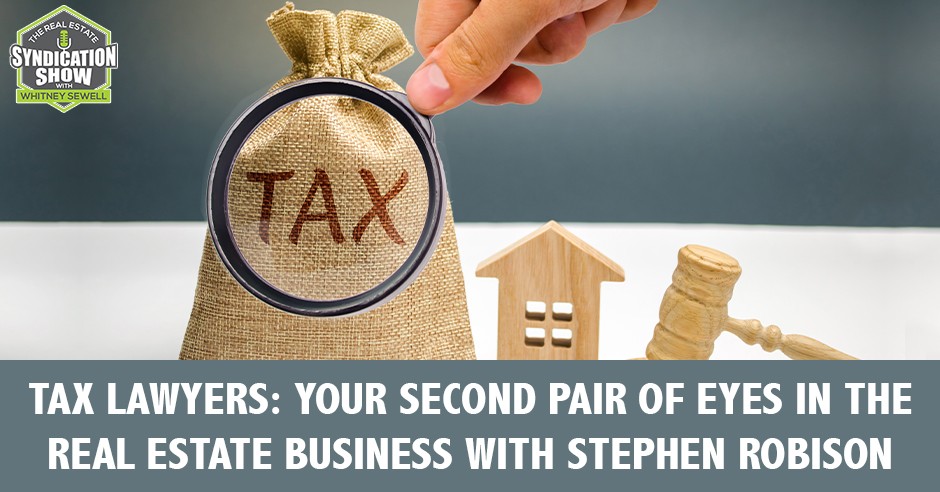Listen to the podcast here:
In real estate deals, you will encounter numerous documents and operating agreements during the buying process. Going through each one of them can be very tedious, so we hire advisors like CPAs and lawyers to take care of the paperwork for us. However, these advisors can’t always keep on top of quick changes. This is where tax lawyers like Stephen Robison step in. Stephen is a board-certified specialist in Federal Taxation Law by the Ohio State Bar Association and President of Strategic Property Exchange, LLC. Tax lawyers are your second pair of eyes that will review every document to make sure that clients’ goals actually get accomplished. If you want to know more about what tax lawyers can do for you, you have to listen to this.
—
Watch the episode here:
Tax Lawyers: Your Second Pair Of Eyes In The Real Estate Business with Stephen Robison
Our guest is Stephen Robison. Thanks for being on the show, Stephen.
Thank you very much.
Stephen is a board-certified specialist in Federal Taxation Law by the Ohio State Bar Association and President of Strategic Property Exchange, LLC. Ohio Bar Association board-certified specialist in federal tax law since 2001, he was named six times Ohio Super Lawyer by Law and Politics Media in the area of taxation law from 2003 through 2008. He earned his BA degree and his JD degree from the University of Cincinnati and his LL.M. degree in business and taxation from the University of Bridgeport. Stephen, thank you so much for your time. I know you’re going to provide so much value to the readers what we’re going to discuss. Give them a little bit about who you are and what your focus is right now.
I’m a tax lawyer and we also have an exchange company. When I say exchange company, that means that we help facilitate people who sell real estate, take those proceeds and reinvest them into other real estate so they don’t have to pay the tax. If you can help someone save $1 million in tax, you have a friend for life and they’ll send you Irish whiskey Christmas time every year. We handled these property transactions all over the country and overseas as well. The way I pinpoint what is it makes us different than other people is that we will review every document, loan documents, operating agreements to make sure that what the client wants to achieve is actually achieved.
We’re not trying to put off their other advisors like CPAs or lawyers. We’re here as a second pair of eyes to make sure that what they want to accomplish does get accomplished. Typically, their other advisors have so many other clients that they can’t keep on top of these quick changes where someone will call in at 2:45, the closing is at 3:00. “I want to borrow twice as much money. Is that okay? I want to go to Bimini with the money. Is that okay too?” You have to talk them off the cliff. You can’t do that. Our job is to manage and monitor that process.
You brought up a great point too. You’re reading every document, so you’re making sure what the client wants actually happens. I know it’s common that we don’t read all the documents. If a PPM, Private Placement Memorandum is 100 pages, how many people are reading that?
[bctt tweet=”The more effort you make to educate your investors, the more comfortable they’re going to be.” username=””]
They’re designed so no one wants to read them. There are subliminal go-to-sleep messages on the pages. You’re thinking, “Is that in ancient Greek? My Greek is rusty.” You have to force yourself to get through that.
A lot of it we wouldn’t understand even if we did read it. That’s what you do for people. You’re reading those documents because you understand the Greek terminology and you can explain it and make sure we are protected. We’re getting what we’re signing up for.
We translated back into Standard English. From words that meant to confuse you, to something that’s basic. As a consequence, when the real estate market had a downturn, our clients had gone into properties like these that were syndicated and none of our clients had any problems. None of their properties blew up because we were careful in making sure that they understood what they were getting and it was a solid investment. Some companies went under and the clients suffered greatly, but those were not the ones that we had advised people on.
Can you give us some examples of documents that are a must to be reviewed by somebody like yourself? If I’m going into under a contract and I’m fixing to invest. What are some documents that I definitely need to contact somebody like yourself to review?
Prior to that, you have a purchase and sale agreement, which of course everybody would be looking at. Then a second one is an operating agreement. We had a sale of a property in Texas. In the operating agreement, there were two kinds of payouts. There was a payout while the property was operating, which benefited the managers, and then there was a payout for the owners when the property was sold where there was a 10% swing in the payout. The accountant had not picked up on that on the tax return. He showed a higher payout for the managers rather than a higher payout for the owners. When we were reading through it, we noticed that the client was entitled to an additional 10% of the sale proceeds. A big number because I think the property sold for $20 million.
We were like, “You see the words here, it says he gets more.” That of course was a big stink when we discovered that. Another example is the loan documents. Where they say, “I’m going to borrow $1 million.” He said, “That’s great. That’s the amount you need for your exchange,” but then you read the loan document and it says, “No, I’m borrowing $10 million. I’m actually using the money to create a gold straddle partnership in Ukraine.” You’re like, “You can’t borrow that additional money on this exchange because it’s not going to the property.” Loan document is another example of tedious, boring document. You have to read operating agreements, other side agreements that suddenly appear out of nowhere. We have a side agreement, “Can I see that?” An undiscovered document shows up.

A side agreement, would that be something we get the contract whatever it may be, but then two weeks later we get this side agreement?
It might say something like, “I’m going to give 10% of the profits to a developer or someone who was involved originally.” Many times what we’ll say is, “That’s okay as long as it’s treated as a profits interest because that could be treated as a sale expense.” You don’t have to worry about, “Do I now suddenly have a partner in the deal that I didn’t know I had before?” and then they would have to go forward into the new deal and they don’t want to. It’s addressing who gets what and what does this mean.
Who’s your typical client? Is it going to be syndicators and passive investors or is it going to be mostly passive investors?
It’s going to be owners of real estate and they can either be in the form of an entity, like a partnership, a trust, whatever it might be or in their individual names. They could be people that are much older. They’re looking to in the case of syndication, let’s say for example, the husband’s passed away and the wife wants to sell your 40 apartment buildings. She wants to buy something that does not involve management. It would be a typical investor going into a passive investment or people who inherited property years ago. It was very common when the estate tax was much higher that people were gifting property left and right. They own this property since 1980 at a very low basis and they’re selling it because they’re getting a good deal, but they don’t want to manage the property. They have no understanding of how to manage the property. They might be an orthodontist in Pasadena, California. They have no desire to manage the property.
How long does it typically take to review those documents? Let’s say I’m a passive investor or I’m going to send you a PPM or the operating agreement. What turnaround time should we expect?
If we use a sleeping aid, which keeps us awake like these high energy drinks so we can read those faster, I would say typically our normal turnaround time is we try to get stuff down the same day or maybe the next day. If it’s more complicated if it’s a PPM, for example, it might be a couple of days and then we have to set up a conference with the client to explain what’s going on. You might have a back and forth going on. It might take a couple of three days.
[bctt tweet=”Rather than simply giving an answer, explain how you got to the answer so people can take that information and use it in the future.” username=””]
That’s fast. We could use that same example you talked about, you got this widow. Her husband managed this property for how many years and she doesn’t want to manage it. She wants to become a passive investor. She’s going to 1031 it into syndication. As a syndicator, I want to be prepared to take that 1031 money. I want to be able to provide that avenue for her. How do I make sure that I’m prepared as a syndicator to be able to allow that 1031 exchange into my deal?
The first thing that you get into is it cannot be a partnership. We get that question a lot. Someone will say, “I own this building, I’m going to sell this and take the proceeds. I’m going to buy a 5% interest and a partnership.” That doesn’t qualify under 1031. Even though there are some people who suggest that it might, that’s just whispering in the wood so that doesn’t count. You cannot buy interest and a partnership. Your choices are number one, you can elect to be treated as what’s called a Delaware’s Statutory Trust, DST for short. When you buy in, you are treated as an undivided interest in the whole property and when you sell out, it’s the same thing.
If you’re a DST structure, that works. Also, if you buy it as a Tenant In Common, which means a Tenant In Common would be for example, you and I and my six brothers-in-law, we all own something together. We all own one-eighth interest in this property. Because it’s commonly owned as Tenants In Common, then we can do that as an exchange. Many times, there’s a confusion between buying in as a partnership interest and buying in as a DST. There are still a lot of promoters who have properties are being sold as a partnership, but those don’t qualify. One thing that comes up that’s very interesting is you will buy-in and then they will immediately refund the money back to the investor.
They’ll borrow too much and they will distribute this money back to them. That does not qualify. Among the exchange intermediaries in the country, we have a trade association and among those people who know what they’re talking about, there are teachers or lecturers, we have lots of degrees. That’s not considered legitimate to buy-in and maybe receive your money back. It’s interesting, it’s what gets people excited. A client finds out that he’s going to buy-in and get all their money right back, that generates a lot of excitement. You have to probably spend at least half an hour explaining to them, “It sounds great but that will make your exchange fail.”
You can’t buy into a partnership with a 1031. I was thinking about the structure of syndication and some people say, “I can take 1031 or I can’t take 1031 or maybe I don’t want to.” I wonder what the difference was. If we could elaborate on that a little bit.
The main difference is that as a syndicator you say to yourself, “Do I want 1031 exchange money? Is that something that I want to do?” If the answer to that is yes, then you have to structure your transaction either as a Delaware Statutory Trust, which is a partnership that is made as an election. What it does is while it allows you to receive this money, it also restricts your ability. There are significant restrictions and limitations as to how you run the property. You cannot make major repairs on the property. You cannot change or refinance the loan. Those are probably the two biggest. Think of it as you’re putting everyone onto a little ice flow and you’re pushing them out in the North Atlantic and you can’t do anything. It just runs its course.

These DSTs came originally from the old Sallie Mae, Fannie Mae, Freddie Mac-type loans where people would buy into these loan portfolios but there could be no changes with the structure or the investment. You would simply receive your money and if it’s sold, you receive your principal but for the trustee, it took no actions to maintain these investments. That’s the way these DSTs work. They work best if you have a single-tenant, large property that is a run on a triple net lease basis. That is the ideal for these. It would be very hard to do that on a big apartment complex because you’re going to have people calling all the time and saying that, “My sink is stopped up or my kitchen caught on fire, or my child just fell through the window into the pool below and there was no water in it.” The normal maintenance things you deal within an apartment building.
What about doing a 1031 from one syndicated deal to another? Be prepared for that or maybe the syndicator who’s in that situation was coming up, “We’re fixing to exit this deal. We want to be prepared for a 1031.”
There are two general rules about exchanges. One is let’s say I sell a building for $1 million. I have $400,000 of cash and $600,000 of debt. When I go into my next transaction, I know that I have to buy a property for $1 million and I can have no more than 60% debt on that property unless I buy up. If I buy something higher, I can have more debt. The point is when you buy into these syndicated investments going into them, you have to make sure that you’re not borrowing too much money. You have this range where investors were saying, “I’m going to borrow a certain amount of money.” Sometimes when they borrow money because they’re buying a larger property piece, they have a lot more debt.
When they come out of these, sometimes they’re surprised at how much they have to buy the second time. They may have had a very small investment of let’s say $400,000. They put all their cash in and when it’s sold later because of the debt on the syndicated deal, then their share of the sale is now $2 million. They’re like, “I wasn’t prepared to buy a property for $2 million. That’s a much larger deal for me.” Part of the issue is getting the debt and equity fraction close, therefore you’re not surprised when you sell out of it. Rather than not paying any attention to the debt-equity mix going in and then when you come out you’re like, “I had no idea that I would have to buy a property for $2 million. All I sold what I went in was $400,000.”
Having a clear understanding of what the debt-equity mixes and tries to get close because there are lots of deals out there and the debt mixes are all different. Everyone has their space in the market. Half debt, 60%, 70%, 80%. Many have zero-coupon type ones that are 95% debt for people who are doing foreclosure exchanges or the coffin exchanges. Where they have almost no cash, whether you’re going to buy something and let the income amortize out the debt. You just have to be very careful about what are your mix is.
I wanted to go back to the documents and let’s elaborate on that a little bit. I want to just ask you, how do you like to see documents prepared? If somebody’s sending you a PPM, is there any red flag that jumps out to you and says he’s a newbie or this is not something that you want to probably invest in because of this? How do you like to see when you see those documents and says, “This is a solid operator here?”
[bctt tweet=”A well-educated lawyer or CPA is much more valuable to their clients.” username=””]
There are two things I look for. Number one is, “Do the sponsors have a long history of being involved in the real estate world?” They know the business, so you know that what they’re picking are solid properties or is this someone who just got started and they normally are financial intermediaries? Where they’re putting money together, buying a property and then they essentially are walking away from it. They have a manager that’s running it. Their involvement pretty much ended when everyone bought in until you want people obviously, that has a long-term interest in the real estate world.
Number two, you go through these materials and you basically see what are the fees being charged. Of course, they don’t make it easy on you to find those. It’s like the SEC requires twenty pieces of information, but they didn’t say to put them all in the same spot. They’re scattered throughout the whole document, usually written in Greek upside down and footnotes for you to find this stuff. It’s a fun process to find this stuff, but you have to determine are the fees being charged fair? Is the amount of money being charged on the upfront, what are the terms of the debt? That’s a big deal because at some point in time when will the debt term out. Is it a five-year debt, seven-year debt or ten-year debt? Because you want to be able to have a long enough debt term that you’re not forced to sell at a bad time. There are always cycles in the real estate business and you don’t want to be forced to sell out at a time when the market is down. The longer the term, the more flexibility you have in terms of when can you exit this investment? The loan terms are important, the fees are important, the experience of the syndicators are important. Those are all keys. If things go badly and there’s always that chance, “What’s the fallback position? What’s plan B on this?”
That’s some great advice and great tips, even including that fallback position or what’s going to happen when this happens. We’re changing gears a little bit. Stephen, I know you’re in a different position than an operator or something like that, but what’s been the hardest part of this business for you?
For our job as an educator to our client, we have to take what appears to them, they may look up and find five deals on the internet or through a broker. For them, all five are equal. They look at them, they all look the same, but they’re not the same. They all have unique characteristics and they have their different risks, reward type scenario. You have to say to yourself, what kind of property is it? What is the long-term risk? What would happen if the operator went bankrupt? What would happen to the property if you have a Chicken Licken restaurant as in the shape of a large rooster flying away? You’re just going to have to bulldoze that. If that thing goes under and no one’s going to want the Chicken Licken. If it’s something that can be reused or it’s located in an area that is still decent, then that property can be recycled into something else.
From your experience, what is your best advice for how syndicators should take care of investors?
They have to decide what is their target market and who they want to address. With that, then they want to be able to tailor their offering to those clients. As opposed to doing a broad brush, you say, “I want to be able to target this particular kind of investor.” That might mean what my level of debt is. It might mean how many people am I bringing in? How will this property be managed? How long will the term of debt be? 90% of the people coming in are not going to have a lot of prior knowledge on how these things work.

I think that the more effort you make to educate them, the more comfortable they’re going to be and the less potential blowback there might be in the future. You don’t want to try to be all things to all people. It is a good market. There are a lot of people that are retiring, a lot of people that are getting older. You can’t stop the aging process. If you want to be in this market, there is a big market for retired investors who don’t want to pay taxes. That’s their favorite thing in the world. If you can provide a solid investment tailored to them, you have all the business in the world that you can take care of.
What’s been the number one thing that’s contributed to your success?
Our job as adviser and educator to our client to make sure they’re getting exactly what they want and there’s no stone left unturned. If you knock yourself out every day doing your best job, they’ll tell two or three people. You do a bad job, they’ll tell 40 people. If you do your best job, then that takes care of itself.
Steve, how do you like to give back?
For me, one thing is helping other lawyers and CPAs understand what they’re getting into, rather than simply giving them the answer, you explain how you got to the answer, then they can take that information and use it in the future. A well-educated lawyer and CPA are much more valuable to their clients and they can do a better job because they don’t necessarily have the time to research this. We’re also a resource for them. They want to call me up anytime during the day, they want to call me up, ask questions, we’re always open for that. We have an open door, open phone policy to make sure they understand the nuances of what’s happening.
Steve, you’ve been a great guest. I appreciate your time and sharing your expertise with the readers. How can they get in touch with you?
They can get in touch with us either through our website, which is www.SPE1031.com. Our contact information is on that website. Our phone in Cincinnati, because we’d like to give out the toll-free number, is (877) 395-1031. Thank you very much.
Thank you very much. I appreciate you and your time and you being with us. I appreciate the readers being with us as well. I hope you’re sharing the show and learning. I hope your business is growing because of it. I hope you’ll go to Life Bridge Capital and connect with me, schedule a call. Also go to our Facebook group, The Real Estate Syndication Show so we can all learn from experts like Steve and grow our businesses together.
Important Links:
About Stephen Robison

Ohio Bar Association Board Certified Specialist in Federal Tax Law since 2001; named six times “Ohio Super Lawyer” by Law and Politics Media in the area of Taxation Law for the years 2003, 2004, 2005, 2006 2007 and 2008. Steve earned his B.A. degree and his J.D. degree from the University of Cincinnati, and his LL.M. degree in Business and Taxation from the University of Bridgeport.
Love the show? Subscribe, rate, review, and share!
Join the Real Estate Syndication Show Community:




